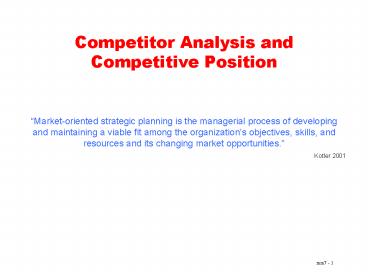Competitor Analysis and Competitive Position - PowerPoint PPT Presentation
1 / 16
Title:
Competitor Analysis and Competitive Position
Description:
... objectives, skills, and resources and its changing market opportunities. ... Level of switching costs, Degree of customer franchise, # of suppliers ... – PowerPoint PPT presentation
Number of Views:44
Avg rating:3.0/5.0
Title: Competitor Analysis and Competitive Position
1
Competitor Analysis and Competitive Position
Market-oriented strategic planning is the
managerial process of developing and maintaining
a viable fit among the organizations objectives,
skills, and resources and its changing market
opportunities. Kotler 2001
2
Planning Actions
- Strategic planning calls for action in three key
areas - Managing the companys businesses as an
investment portfolio - Assessing strengths by considering market
characteristics and the companys position and
fit in that market - Developing a game plan for achieving long-term
objectives - Adapted from Kotler 2001
3
Three Competitive Forces that Shape Competitive
Position and Profitability
1. Industry Forces Attractiveness of the
competitive environment 2. Competitor
Benchmarking Strength vs competition 3. Competi
tive Advantage Inherently desirable
characteristics that are sustainable
4
Figure 6.1, Competitive Forces That Shape
Competitive Position and Profitability
1.1 2.1 3.1 1.2 2.2 3.2 1.3 2.3 3.3
5
Industry Forces Market Entry/Exit (1.1)
1.1 Market Entry/Exit 1.2. Buyer/supplier
Power 1.3. Substitutes/Rivalry
- Market Barriers to Entry
- Market Barriers to Exit
6
Industry Forces Buyer/Supplier Power (1.2)
1.1 Market Entry/Exit 1.2 Buyer/supplier
Power 1.3 Substitutes/Rivalry
- Customer Buying Power
Supplier Selling Power
7
Industry Forces Substitutes/Rivalry (1.3)
1.1 Market Entry/Exit 1.2 Buyer/supplier
Power 1.3 Substitutes/Rivalry
Product Substitutes (broad market definition)
- Competitive Rivalry
8
1. Industry Forces and Profit Potential
Industry Forces Unfavorable Favorable 1.1
Barriers to Entry 1 2 3 4 5 6 7 Political,
Technology, Resources 1.1 Barriers to Exit
1 2 3 4 5 6 7 Legal, Specialized assets,
Strategic importance 1.2 Customer Buying
Power 1 2 3 4 5 6 7 of customers, Purchase
quantities, Ease of switching sellers 1.2
Supplier Power 1 2 3 4 5 6 7 Level of
switching costs, Degree of customer franchise,
of suppliers 1.3 Substitutes 1 2 3 4 5 6 7
1.4 Competitive Rivalry 1 2 3 4 5 6 7
of competitors, Level of differentiation, Degree
of excess capacity
9
Competitor BenchmarkingCompetitor Intelligence
(2.1)
2.1 Competitor Intelligence 2.2 Competitor
Analysis 2.3 Competitive Benchmarking
Competitor Benchmarking Competitor Analysis
(2.2)
- Competitor Intelligence
- Market-based performance
- Operating performance
10
Perceptual Map
11
Competitive Vulnerability MatrixAttitudes and
Purchase Intentions
Attitudes towards Competitors A B C D
Purchase Intentions Competitor
A .4458 -.2470 -.1015 -.1717 Competitor
B -.1623 .7249 -.2353 -.2504 Competitor
C -.1039 -.1175 .7715 -.1643 Competitor
D -.2948 -.3193 -.1980 .6644
12
Competitor Benchmarking Competitive
Benchmarking (2.3)
2.1 Competitor Intelligence 2.2 Competitor
Analysis 2.3 Competitive Benchmarking
- Benchmarking
- Identify key area of competitive weakness
- Identify benchmark company
- Track the benchmark companys process advantage
13
Competitor Benchmarking Priority/Performance
Matrix
1.09 1.06 1.03 1.00 .97 .94 .91
.88 .85
Quality Equip 2 3 14
Parts Inventory 3 2 4 1
Equipment Price 4 32 1
Parts Price 3 4 2 1
Repair Service 2 3 1 4
Resale Value 3 2 1 4
Salespeople 4 23 1
.85 88 .91 .94 .97 1.00 1.03 1.06 1.09 1.12
14
Competitive Advantage Cost Advantage (3.1)
- Variable Costs
- Scale Effect
- Scope Effect
- Learning effects (Experience Curve)
- Marketing Expenses
- Line extensions
- Family branding
- Advertising size
- Operating Expenses
- Standardization
- Technology
15
Competitive Advantage Quality Advantage (3.2)
- Avenues for Differentiation
- Product Advantage
- Service Advantage
- Reputation Advantage
16
Competitive Advantage Marketing Advantage (3.3)
- Sales Force Advantage
- Brand Awareness































